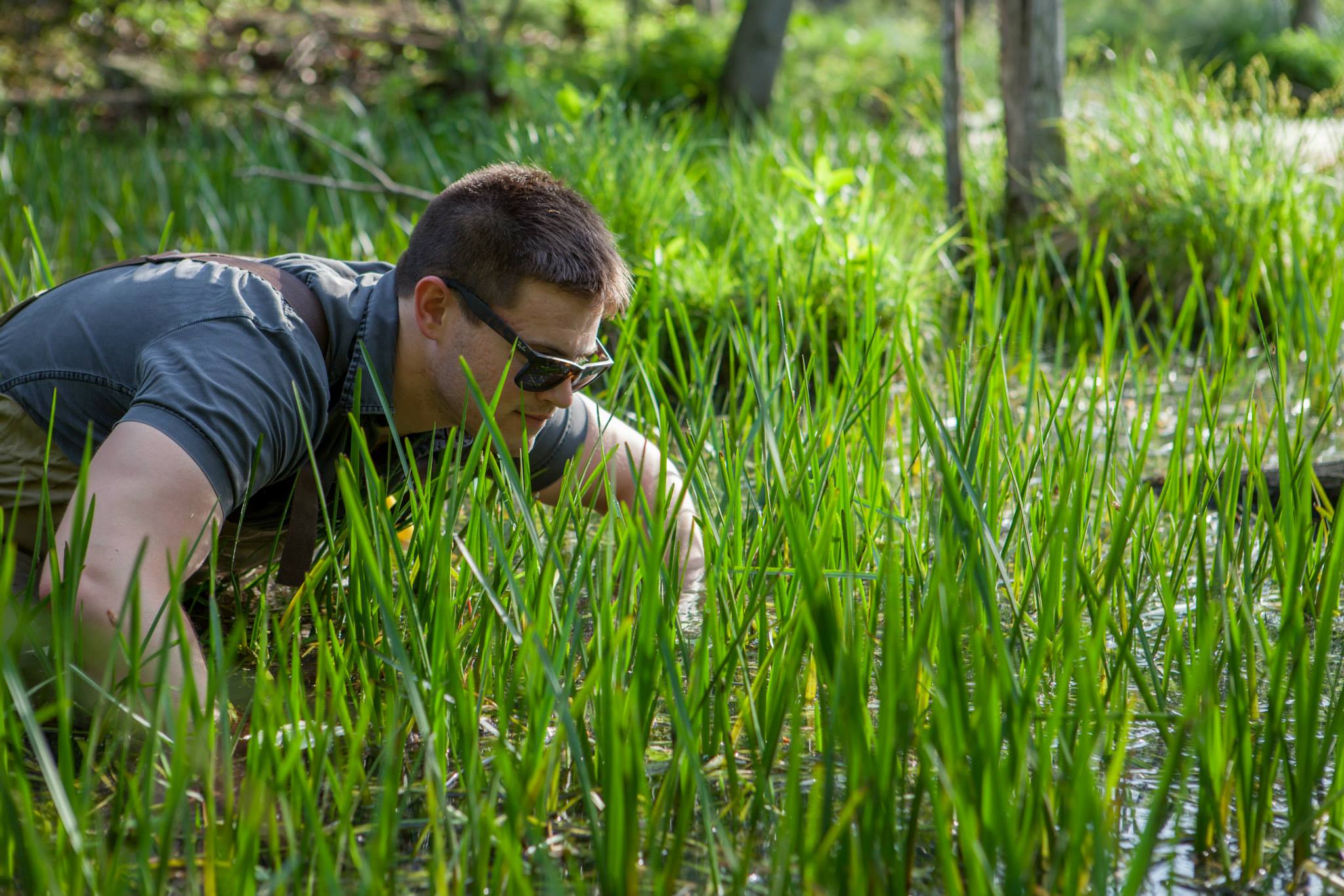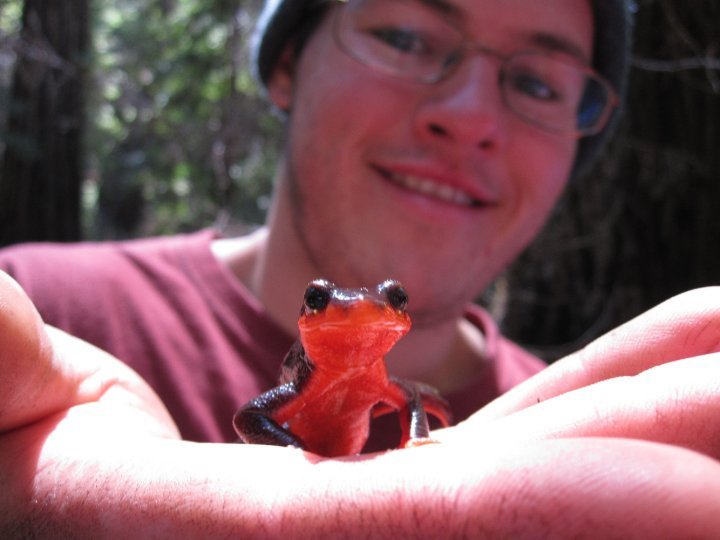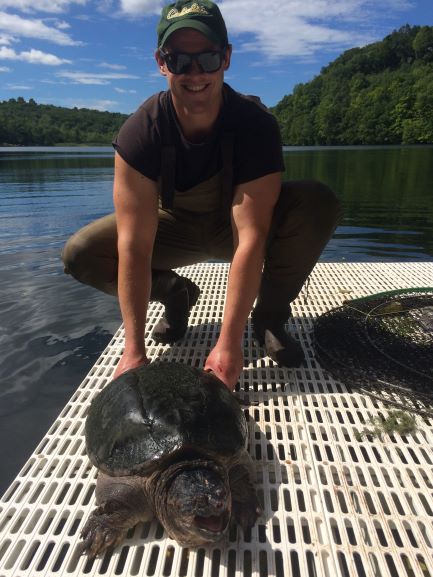
Clockwise: Max with a California giant salamandar (Dicamptodon ensatus). Photo credit: Nora Hawkins. Western pond turtle (Emys marmorata),
a threatened species undergoing review for listing under the US Endangered Species Act. Photo credit: Max Lambert.
A North American green frog (Rana clamitans). Photo credit: Max Lambert
We held a Q & A with wildlife biologist and 2019 Smith Fellow Max Lambert to learn more about him and his career, how he knew he wanted to pursue a career in conservation biology, what he loves most about what he does and what skills you need to have to be a wildlife biologist.
Tell us a bit about yourself.
I'm a wildlife biologist who integrates ideas urban ecology, evolutionary biology, the study of sex, and conservation biology. I grew up just outside of Phoenix and watched throughout my childhood as the deserts surrounding Phoenix were consumed by relentless urbanization. I didn’t realize it until college that I had a passion for understanding how urbanization impacts wild animal communities, how these animals respond to urbanization, and how we can tweak our urban design and management to make human environments more hospitable habitats for the rest of life on Earth.
This is where I’m at in my life and career now. I love “natural” places that have minimal obvious human influence. But urban and suburban places are an becoming a dominant part of the global landscape and increasingly so. I’m fascinated by these urban environments and, from personal and professional perspectives, I want to make sure urban areas are built to be more habitable.

Max searching for frogs in a rural, forested area of Connecticut.
Photo credit: Geoffrey Giller
When did you know you wanted to pursue a career in conservation biology? What made you think you could make a difference?
I’ve actually waffled back-and-forth on this for years. I’ve never had a life-changing event in my career as much as I’ve had life changing people.. Mike Trimble was one of my high school teachers and he completely shifted my life trajectory. I’ve always loved the outdoors and animals but thought I was going to pursue a career in medicine. Mr. Trimble taught a class called “advanced biology” which I thought was mostly going to be human physiology or something like it. It wasn’t. He created a high school course that integrated environmental science, wildlife conservation, indigenous knowledge, and policy. He also scraped together a number of small grants every year to get students hiking, identifying plants and animals, measuring the environment, and just thinking about their place in local habitats and the global ecosystem. I went to public school in Arizona; this was very much a unique experience. I don’t know where I would have been without Mr. Trimble but I can say for sure he entranced me with a career in environmental science and conservation biology.
The other person who radically changed my life was Brad Shaffer, a professor mine in college. I didn’t really have a good sense of what I wanted to do in wildlife conservation and more or less thought all the science that was needed already existed. Brad’s research interests are eclectic and range from on-the-ground population conservation to cutting-edge phylogenetics. Brad taught me how to think holistically about environmental problems and helped me realize how little we actually know about the natural world. But he also showed me how rigorous research can be a game changer for successful conservation. In Brad’s lab I was encouraged to do some independent research on an urban population of western pond turtles, a species of special concern in California and a turtle currently undergoing review for listing under the US Endangered Species Act. The several projects I did on this species cemented a love of research and demonstrated that urban conservation efforts are entirely worthwhile exploring. Brad definitely showed me the path to conservation science and demonstrated that we can make a difference.
Over my career, the degree to which I’ve understood that I can make a difference has ebbed and flowed. When I was younger, I was frustrated by the human dimensions of conservation, in large part because I was never taught about the importance of considering people when approaching environmental issues. As I’ve advanced throughout my career, I’ve increasingly understood how critical it is to incorporate human needs and desires into conservation, not only for more effect environmental and wildlife management, but for creating a more just and equitable world. Embracing this, I think, has led me to become a better person and better conservation biologist who can actually do some good, both for people and for wild things. It’s easy to dwell on the seemingly unforgiving doom we’ve burdened the world with. But I think we can and should be optimistic that we can make things better.
What's your favorite tip for someone in our industry (conservation biologists)?
Know your topic well but, as often as possible, try to chat with people in different fields or who come from different backgrounds. You’ll always learn something new or think about your problems in different ways by getting a diversity of perspectives.

Max with a red-bellied newt (Taricha rivularis).
Photo credit: David Gonzales
Is there any advice you would give to someone starting out in your chosen career?
Find wonderful mentors and a community who can help you discover and shape your passions. Start close by, you can find mentors and a community right at your school or in your own neighborhood. Don’t be afraid to email someone anywhere in the world who is doing work that excites you; more often than not they’ll love it. I’ve also found the conservation community on Twitter to be phenomenal. Social media now let’s people of all career stages and job types from across the world to interact and I think it’s generally become a positive thing for the conservation community.
What are the skills you need to have to do the type of work you do? Where and how did you learn these skills?
Conservation biology requires such an assortment of field and analytical skills these days that I feel like I’m always learning something new! A lot of my work draws on landscape ecology ideas. This means using a lot of GIS (geographic information system) methods to identify sites with different landscape characteristics and to perform spatial analyses. It also means a lot of time doing field work. Field work is great because you can get dirty and see great animals in amazing environments. But it also means learning to learn how to rigorously sample to get a relatively accurate understanding of the natural world. A lot of the analytical, statistical, and field skills I’ve learned by reading, trial-and-error, and (when I’m lucky) having a colleague who can teach me!
What do you love most about what you do?
Many days it’s the critters I have the privilege to interact with. But in general, it’s doing work with colleagues across the world who have similar ambitions for creating a more sustainable, habitable, equitable, and just world.
Max with a snapping turtle (Chelydra serpentina) in Connecticut. Photo credit: Tess Brown
What's next for you in your work? What are you looking forward to?
I was just awarded a David H. Smith Postdoctoral Fellowship from SCB and so I’ll be splitting my time between Berkeley, Portland, and Seattle over the next couple of yeras. I’m really excited for this work because it’s the first time we get to test whether we can use ideas surrounding rapid evolutionary change in wild animals to manage them better in our cities and suburbs. What excites me most about the Smith Fellowship is the outstanding mentorship I’ll have from academics and conservation practitioners. My academic mentors are Bree Rosenblum at UC Berkeley (my current postdoctoral advisor) and Marina Alberti at the University of Washington. Together, Professors Rosenblum and Alberti provide phenomenal expertise in amphibian evolutionary biology and urban studies. My practitioner mentors are Laura Guderyahn, a biologist for the city of Portland, and Priya Nanjappa, director of operations for Conservation Partners; both of whom have unparalleled expertise in conservation at multiple spatial and political scales. It’s going to be a privilege to work with these individuals and hopefully get some research done that will be tractable for urban design and urban biodiversity management, not just in the Pacific Northwest, but globally.
What are you happiest doing when you're not working?
Recently I’ve had far too much fun using a game camera to keep track of our neighborhood’s raccoons, barn owls, and rats. But my partner and I spend of lot of time tending to our garden, lifting weights, and hiking. Our outdoor interests are pretty diverse so sometimes we just enjoy wandering around and other times we watch birds and photograph mushrooms.
